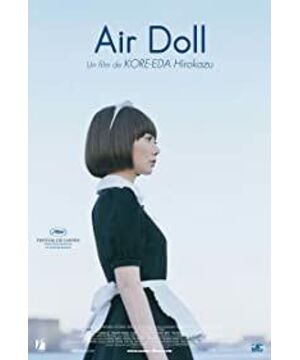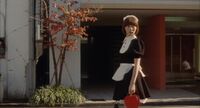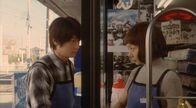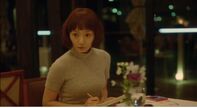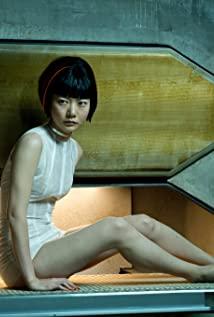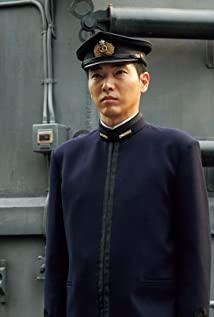I originally wanted to take the title of this film review as "A Long Time, Seeing People's Hearts", and I felt that using such a serious tone to tease a serious and serious movie, although it can get some eyeballs , But that kind of self-righteous cleverness and humor, in fact, is not solemn. In addition, it can generalize too narrowly, far inferior to "urban hollow people."
The content at the beginning of the movie can indeed be summed up as "days" have seen people's hearts for a long time: an inflatable doll, after a sexual encounter, suddenly came alive and turned into a human. Then to love, to be hurt, to welcome destruction. The whole movie is simply such a content. The picture of the movie is always fresh and bright, and the lens is beautiful and charming. At first glance, people think it is a pure love movie, but after closer inspection, it is found that this is not the case at all.
In general, I think this movie can be divided into three parts: The first part is like Xiaowang's (Pei Douna) jumping small steps and a playful soundtrack. It is brisk and quiet. From the beginning to Xiaowang, I found the video store and met the clerk. Junichi (Jingpuxin), the duration is about 18 minutes; the second segment started from Xiaowang and started working in the DVD store. Although there are many refreshing moments, the overall dull and tangled, the tone is depressed, and the duration is more than 70 minutes; the third segment bursts, the tone Desperate, he went to Chun's family from a young age, cut his stomach, and continued until the end of the movie, which lasted more than 20 minutes.
In terms of style, the first paragraph is the tune of Yuka Kee in the past, the kind of unhurried feeling. The second paragraph is common in most Japanese art films. The third paragraph is more like the early Jin Ji-de, shattered at once, without even giving a little room for breathing. Just because of the gap between the first paragraph and the second paragraph, and the somewhat lengthy preparation and savings of the second paragraph, most people are not able to stick to the third part and they are too timid.
At the beginning of the movie, the wretched uncle (Sakao Soro) said to the doll, "There are a bunch of people lining up to take your place." This kind of self-deprecation does not mean how important the position is, but that he is dispensable. The reason why he can only talk to himself so babblingly in front of an inflatable doll is to express his inner self-esteem and fear: "He is really useless." As far as he and the doll have sex, it is like a couple. Such a passion just made me dumbfounded.
Of course, I didn't understand this panic at first, including dialogues such as "burnable garbage" and "non-burnable garbage", and I thought it was just an ordinary conversation. After watching the complete film, I realized that these arrangements are all foreshadowing and suggestive, full of profound meaning.
What is "heart"? It is nothing more than the meaning of being cared about and valued. A puppet with a heart, a group of people without a soul, this was originally the greatest mockery of the world. Xiaowang is just an inflatable doll, a substitute for people to vent their sexual desires, and it's still old and cheap. When she realized this, her heart was filled with depression. She may not understand, in fact, people in this world are more like useless dolls than her.
However, Xiao Wang's "heart" is actually not thorough, but primitive and chaotic. She is both happy to come to this world, but also hurt because of her "heart". She couldn't understand why the urbanites living in the reinforced forest were more empty than an inflatable doll. Uncles who accompany the dolls, neglected women, babbling old women, peeping customers, home girls living in the trash... These people are turbulent because of their emptiness, they are uneasy because of their uselessness, and those who are not needed deeply The loneliness is not only the confusion of Xiao Wang, but also the frustration of the director.
So let us understand where is the "eye" of this movie? I think there are two places.
Ming is naturally the old man, his words: "Do you know a kind of worm called mayfly? It died a day or two after it was born, so its body is empty, it has no stomach or intestines, but it is full of eggs. It is something that was born for birth. Human beings are not much different, aimless." And his poem: "Life/may be/cannot be created by its own power/successful completion/like Flower/Even if the stamens and pistils are gathered/not enough/Insects and breeze are still needed to visit/Connect the relationship between stamens and pistils/Life is in essence/There is an important lack/And it is fulfilled by the existence of others/ However / we are each other / lack of this important self / unawareness / have not been told / it turns out that we are the seeds to be sown."
Xiao Wang seemed to understand. She told the old man that she was also empty. The old man said that he was also empty. Recently everyone has been, especially everyone living in this kind of city.
The dark one is the puppet creator (Odagiri Joe), his words. When Xiao Wang walked to the doll making room, he saw dolls with broken limbs and severe injuries all over the floor. "They are all the same at the beginning, but when they come back here, you can tell from their faces whether they are being cherished. I guess they may have both been cherished." "I will throw them away every spring. It's a pity that they are'non-burnable' garbage, but after we die, it is'burnable' garbage, and it makes no difference. "
Yes, it doesn't make a difference. Huang Xiaozhen sings in the song "The Appreciation Period": "We are just canned food, and it is not worth keeping after the expiration date." But to Xiao Wang in the movie and other urbanites, they even don't even have the meaning of canned food. It is treated as expired at any time.
After learning that Xiaowang is an inflatable doll, Junichi said "Me too". Xiao Wang believed it, and said that no wonder it felt familiar. I believed it at the time, and then I thought it was just a comfort. But thinking about it now, it might not be a kind of consciousness full of self-deprecating. "We are all the same, we are all empty." So what if you are a real person? The heart is empty.
Xiao Wang felt sad for this meaning of her own, so she was so happy when Junichi said that there was only one thing she could do, even though it made her painful. Later, Xiao Wang cut Chun Yi's stomach with a knife and then he wanted to blow his breath. That scene inexplicably reminded me of "Sensual World".
Junichi died and was thrown into the garbage dump, fulfilling "human beings are combustible garbage". Xiao Wang was also dying in the garbage. The floating dandelion, is Xiaowang's nostalgia for this world, or is it mocking, and saying goodbye? "Perhaps you are too, the wind that blows me."
Some people say that this movie is too desperate, and it doesn't give people any brightness from beginning to end. I think this statement is wrong for two reasons:
First, in the puppet manufacturing room, when saying goodbye, the puppet creator asked Xiao Wang: "Are you sad in this world? , Any good things?" Xiao Wang nodded. Of course there will be warmth. In the restaurant, strangers sang "Birthday Song" for the little girl Meng; on the bus, Xiao Wang took the initiative to let the stranger lean on his shoulders; in front of the garbage pile, Meng put the doll next to Xiao Wang and said: "Me and You change" and shook hands with her...
The other is the last part of the movie. The metaphor at the end is too deep. I don't know how many people are like me. I believe it implies a kind of "rebirth" and "new birth." That birthday surprise was not an illusion when Xiao Wang passed away. There was also Ragdoll’s "Mom", and the last looking down shot and the sentence "It's so beautiful". All of these also indicate that the window of heart will eventually open and life will eventually be opened. possible.
2012-12-1
View more about Air Doll reviews


